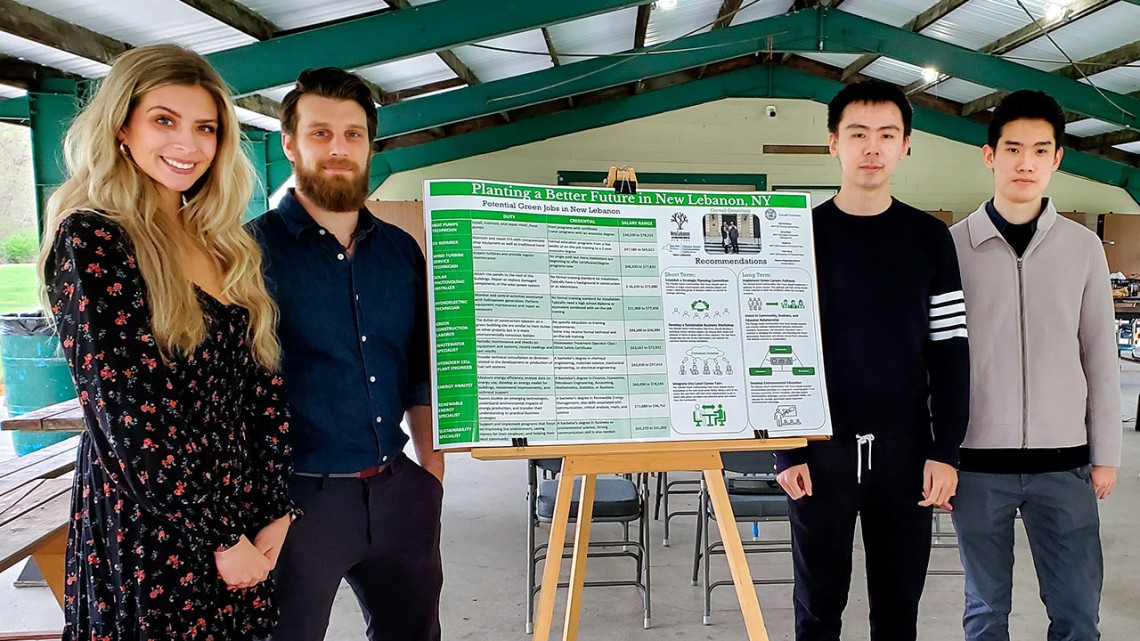
From left, master’s students Kaitlynn Boardman, James Bond, Hubo Wang and Quanqi Su, who are sharing their research with residents of New Lebanon, New York.
Students help NYS town grow green economy
By Jim Hanchett
Cornell master’s students are assisting New Lebanon, New York, as it seeks to expand its economy with green technology jobs, and they are drafting a blueprint for similar communities statewide.
Under the direction of Rebecca M. Brenner, lecturer in the Cornell Jeb E. Brooks School of Public Policy, master of public administration students scanned the regional economy and pinpointed 11 job classifications that would be a good fit with the workforce in the town of 2,300 residents, located about 30 miles from Albany.
The job types include solar panel and heat pump installation, electric vehicle repair, hydrogen cell engineer and wind turbine service technician. The student team, Kaitlynn Boardman, Guanqi Su, Hubo Wang and James Bond, has created a training strategy to share with local high schools, community colleges and vocational institutions.
Those new jobs would replace jobs at auto repair shops, gas stations and heating oil distributors that will likely be lost over time due to climate change.
“Cornell has helped New Lebanon become a regional leader in mitigating and adapting to climate change,” said Town Supervisor Tistrya Houghtling. “Our projects with Cornell have even helped create a road map for other towns and counties.”
The students will present their findings and outline the steps they recommend on July 16 at the Columbia County Climate Carnival.
“This is such a great example of connecting policy to the front lines of climate change,” Brenner said. “We are so proud of Cornell’s partnership with New Lebanon and look forward to continuing this project in the future.”
The project is part of a long-running connection between New Lebanon and the graduate students working with Brenner through the Cornell Institute for Public Affairs (CIPA) in the Cornell Brooks School. Student teams previously helped estimate the town’s energy usage as well as assess its vulnerability to climate change.
The Cornell-New Lebanon connection began two years ago when the town joined New York State’s Climate Smart Communities (CSC) program. Marc Anthonisen, M.P.A. ’21, began an internship in New Lebanon, and Brenner helped build out a full-fledged connection to Cornell. This involved creating a climate road map for the town and then bringing in additional student projects.
The first team of two students, Jessie Hughes, M.P.A. ’22, and Waqar Akhtar, M.P.A. ’22, helped assess how climate change will impact the town. One of the key risks that emerged was seasonal drought, which impacts the fire department’s water supply in late summer. Another intern, Nadia Zaidi, M.P.A. ’22, helped research water storage options and grant funding for the fire department.
“This experience has shown me that it is possible to connect policy to local communities if you get creative about helping people see the benefits of sustainability,” Anthonisen said.
The relationship has flourished, but not without challenges.
To accommodate a wide range of views about climate change, Brenner provided guidance on environmental sustainability initiatives that would help residents see the benefit of the CSC program. One example involved working with town leaders to set up a bicycle recycling program, which has repaired more than 100 bikes for residents. This was followed by a Repair Cafe, a workshop staffed by volunteers who fixed small appliances and toys so they could be reused.
“Going back to our Shaker heritage, New Lebanon has a reputation for innovation,” Houghtling said. “Our people can fix anything. The green economy jobs are the next step in our journey and will help New Lebanon thrive.”
Anthonisen’s internship helped build a template to help other politically divided towns begin implementing a climate change program, Brenner said. Alejandra Plaza Limon, M.P.A. ’22, is working with Columbia County to build out its own climate road map. Based in part on her work, the county is applying for CSC Bronze Certification in July.
“What started with one internship has now produced multiple projects, numerous events, many opportunities for students, significant energy savings and – when the green jobs come to fruition – long-term economic benefit,” Brenner said.
Jim Hanchett is assistant dean of communications in the Cornell Jeb E. Brooks School of Public Policy.
Media Contact
Get Cornell news delivered right to your inbox.
Subscribe
